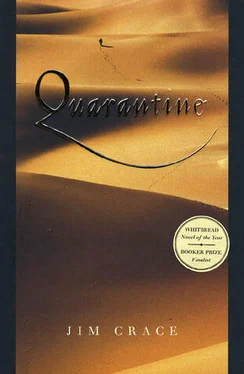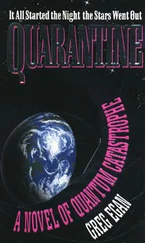Jim Crace - Quarantine
Здесь есть возможность читать онлайн «Jim Crace - Quarantine» весь текст электронной книги совершенно бесплатно (целиком полную версию без сокращений). В некоторых случаях можно слушать аудио, скачать через торрент в формате fb2 и присутствует краткое содержание. Год выпуска: 1998, Издательство: Straus and Giroux, Жанр: Современная проза, на английском языке. Описание произведения, (предисловие) а так же отзывы посетителей доступны на портале библиотеки ЛибКат.
- Название:Quarantine
- Автор:
- Издательство:Straus and Giroux
- Жанр:
- Год:1998
- ISBN:нет данных
- Рейтинг книги:4 / 5. Голосов: 1
-
Избранное:Добавить в избранное
- Отзывы:
-
Ваша оценка:
- 80
- 1
- 2
- 3
- 4
- 5
Quarantine: краткое содержание, описание и аннотация
Предлагаем к чтению аннотацию, описание, краткое содержание или предисловие (зависит от того, что написал сам автор книги «Quarantine»). Если вы не нашли необходимую информацию о книге — напишите в комментариях, мы постараемся отыскать её.
Quarantine
Quarantine — читать онлайн бесплатно полную книгу (весь текст) целиком
Ниже представлен текст книги, разбитый по страницам. Система сохранения места последней прочитанной страницы, позволяет с удобством читать онлайн бесплатно книгу «Quarantine», без необходимости каждый раз заново искать на чём Вы остановились. Поставьте закладку, и сможете в любой момент перейти на страницу, на которой закончили чтение.
Интервал:
Закладка:
It was bad luck to look behind. They concentrated only on the way ahead. Even when they saw the thin, blond head of Shim in front of them, and spotted Aphas walking with a new authority beside him, seemingyounger than he had and vigorous, they did not call out a greeting. They kept themselves entirely to themselves, as they had planned to do. Two women with the fleshly scriptures of at least one pregnancy imprinted on to them. Two women blessed with god and child. They walked until the evening closed in. It did not matter where they spent the night. They were back in the world of the sane and would be safe. Only their faces ached, from smiling.
In the morning, they would carry on along the valley towards Jericho and then take the hilly route through Almog. Green hills. In two days they would reach the approaches to Jerusalem and skirt around the city, through the mud-faced houses on the mud-faced hills, towards Sawiya. They’d join Marta’s neighbours, raising voices, raising sheep, competing for the shade beneath the fig trees in their yards, fighting for their places by the fire. The uneventful world of villages.
They’d be in Sawiya before the end of quarantine. Quite soon, they’d share a table in a room, colourless except for candle flame and the orange and the purple of their mat. They would be dining well on fish. It would be stil, the stillness of the small and tired. If there was something in the world that was bigger, stronger than their table-top, they would not care. It had not spoken to them yet. They were not listening. They were contented with their grainy universe of candlelight and wood and wool.
31
Musa did not waste his energy. He could not vent his anger on the scree. He rested for a while to catch his breath, then gathered his possessions in a pile, the goods abandoned by the men, the goods abandoned by the woman and his wife, the wools, the bedding, all the fabrics of their life. He could not leave them on display for anyone to help themselves. He’d rather have another fire. But there were huge rocks a little lower down the landfall where he could hide his merchandise. He didn’t have to carry anything. He only had to let it slip and roll, and then push the goods into a crevice. When he left, he’d block it off with stones. He could come back, or send someone, to claim his property at any time, so long as the scree did not give way and claim his treasures for itself
The water-bag which Marta had thrown down the scree was too far out to reach, beyond his climbing skills. He had no water, then. He’d be a fool to try to carry on in the heat of the afternoon. The sun would finish him. Certainly he could not attempt to give chase to the women. Instead, he sat beneath the crevice of the rock with his possessions at his back, hiding in the shade. When the sun went down, he wrapped himself in bedding clothes and sat, cursing his misfortune, not getting any sleep. He’d never known a longer night.
In the morning, as soon as there was any light, but before the sun had any strength to it, Musa forced himself to stand and resume his descent to the valley. He only carried the blond man’s staff. He hid the perfume bottles, the gold, the coins and the jewellery in his underclothes. He pushed the ornamented knife into his sash. He was surprised how even-tempered he was feeling. He’d been restored by a night of cursing. Now he only saw one chaHenge in his life. If he could safely get down to the bottom of the landfall, then what could stop him getting into Jericho, and who could stop him there from trading up his bad luck into good? Who’d dare?
His wife and child were far ahead. He couldn’t catch them now. He wouldn’t try. He was divorced from her. He’d look for someone else to puH him to his feet and wash his back in Jericho. Some woman with a little flesh. The very thought ofit relieved him of his anger. He made slow progress down the scree, leaning on his staff for ten steps at a time, and then resting until he grew too stiff to rest. He stopped before midday and once again took refuge in the shade. This time he slept, his head on shale. It left its imprint on his face. There were a few thin clouds that day to screen the sun, so Musa could continue his descent in the afternoon without the opposition of the heat. He finally reached the trading route late in the day, and took his place amongst the stragglers who would have to fight for places at the single inn on the approaches to the town.
Musa was alarmingly tired, and even a little lame. He walked more slowly than the other travellers, all younger, smaller men, loaded down with bags or dragging their possessions on wooden sleds. But one or two dropped back to talk to him. One offered him some water from his bag. Who could he be, this grand, impressive man, with his covering of dust and scratches, his wondrous curling staff, his ornamented knife, and nothing on his back to mark him out as a trader or a proper traveHer? He looked like some king-prophet come down from the hils, like Moses, with his prescriptions for the world.
They were amazed at all the stories he could tell. He’d come from forty days of quarantine up in the wilderness. He hadn’t drunk or eaten anything. He’d gone up thin and come back fat, thanks to god’s good offices. He’d shared his cave with angels and messiahs; he’d met a healer and a man who could make bread from stones. His staff had come to him one night, a dangerous snake which wrapped itselfaround his arm and turned to wood. They could hold it, for a coin. One touch of his staff would protect them against al snakes. He had, he said, some phials of holy medicine. A sniff of each, and aU their illnesses would be cured and al their troubles would be halved. He would not charge them very much, as they were friends and comrades on the road. ‘Come to me at the inn tonight,’ he said. ‘And you will see.’
One of the travellers gave Musa food to eat. Another let him ride inside his donkey cart. He sat on bales of scrub hay, his fat legs hanging off the back. What little sun there was came from the sununit ofthe precipice. Musa looked up to the scree, shading his eyes against the light, and checked the spot where he had left his worldly goods. He was alarmed for an instant. There was somebody climbing down towards his hiding place, halfhidden in the shade. A man or woman? Musa was not sure. Whoever it was did not stop to search amongst the rocks, but hurried down across a patch of silvery shale. Now Musa had a clearer view; a thin and halting figure tacking the scree, almost a mirage
— ankleless, no a^s — in the lifting light.
Musa shouted to his new companions. ‘Look there,’ he said. ‘That’s one I mentioned to you. The healer. Risen from the grave.’ But they were not sure that they could make out anyone. The shapes they saw could be mistaken for disturbances ofwind, and shadows shaking in the breeze. But Musa was now almost certain what he was looking at. It was his little Galy, coming down from death and god to start his ministry. He recognized the weight and step of him.
Musa wondered if he ought to ask the cart-owner to leave him at the roadside to wait for Gaily. But Musa was afraid of being wrong. What if he waited and the man did not appear? What if he waited and the man was some thin figure with another face? What if the man were what they said, a shadow shaking in the breeze? Musa pushed the very thought away. He would not wait, he persuaded himself, because it was not sensible to wait. There were practicalities to bear in mind. The cart was not the choice of emperors but it was comfortable enough, and preferable to walking. The Galilean might be a healer and the lord of miracles, but he was not a cart. No, Musa had to persevere. He’d go ahead until he reached the inn, and then he could pay for two places for the night, if there were any places left. One for himself and one for Gaily. ‘Show me how to tum stones into bread,’ he’d say, ‘and we’ll go into business. I’ll make you richer than Tiberius.’ They’d make a deal, and shake some empty cups on it.
Читать дальшеИнтервал:
Закладка:
Похожие книги на «Quarantine»
Представляем Вашему вниманию похожие книги на «Quarantine» списком для выбора. Мы отобрали схожую по названию и смыслу литературу в надежде предоставить читателям больше вариантов отыскать новые, интересные, ещё непрочитанные произведения.
Обсуждение, отзывы о книге «Quarantine» и просто собственные мнения читателей. Оставьте ваши комментарии, напишите, что Вы думаете о произведении, его смысле или главных героях. Укажите что конкретно понравилось, а что нет, и почему Вы так считаете.












